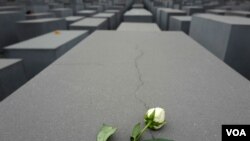ວັນທີ 27 ມັງກອນເປັນວັນທີ່ປະຊາຄົມນານາຊາດ ລະນຶກເຖີງວັນສັງຫານໝູ່ຊາວ ຢິວ
ໂດຍຫວນນຶກເຖິງຄວາມໂຫດຮ້າຍທີ່ໄດ້ເຮັດໃນ ລະຫວ່າງສົງຄາມໂລກຄັ້ງທີສອງໂດຍ
ພວກ ນາຊີ ເຢຍຣະມັນ.
ການສັງຫານໝູ່ ແມ່ນມີລະບຽບແບບແຜນ, ເປັນລະບົບລັດຖະການ, ເປັນການປະຫັດ
ປະຫານ ແລະ ຄາດຕະກຳຊາວ ຢິວ 6 ລ້ານຄົນທີ່ໄດ້ຮັບການສະໜັບສະໜູນຈາກລັດ
ໂດຍລະບອບການປົກຄອງ ນາຊີ ແລະການຮ່ວມມີຂອງພວກເຂົາ. ໂຮໂລຄອສ ຫຼື ການ
ສັງຫານໝູ່ ແມ່ນຄຳເວົ້າທີ່ມາຈາກພາສາ ກຣິສ໌ ໝາຍຄວາມວ່າ “ເສຍສະຫຼະດ້ວຍໄຟ.”
ພວກ ນາຊີ ຜູ້ທີ່ໄດ້ກຳອຳນາດໃນ ເຢຍຣະມັນ ໃນເດືອນມັງກອນປີ 1933 ເຊື່ອວ່າຊາວ
ເຢຍຣະມັນ “ມີຜູ້ຍິ່ງໃຫຍ່ດ້ານເຊື້ອຊາດສີຜິວ” ແລະວ່າຊາວຢິວ “ຊົນຊັ້ນຕ່ຳ” ເປັນໄພ
ຂົ່ມຂູ່ພາຍນອກ ຕໍ່ສິ່ງທີ່ເອີ້ນວ່າ ຊຸມຊົນເຊື້ອຊາດ ເຢຍຣະມັນ.
ໃນສະໄໝຂ້າລ້າງເຜົ່າພັນນັ້ນ ພວກເຈົ້າໜ້າທີ່ ເຢຍຣະມັນ ຍັງໄດ້ແນໃສ່ກຸ່ມອື່ນໆ ເພາະ
ເຫັນເຂົາເຈົ້າມີຜິວພັນແຕກຕ່າງ ແລະ ເກີດມາເປັນຄົນຊັ້ນຕ່ຳຊື່ວ່າ: ໂຣມາ, ຄົນທີ່ພິການ
ແລະ ຊາວ ສລາວິກ ຈຳນວນນຶ່ງ ຄື (ໂປແລນ ຣັດເຊຍ ແລະອື່ນໆ.) ກຸ່ມອື່ນໆໄດ້ຖືກປະ
ຫັດປະຫານ ກ່ຽວກັບ ການເມືອງ, ແນວຄິດ ແລະ ພື້ນຖານການປະພຶດ ຮວມໃນນັ້ນແມ່ນ
ລະບອບ ຄອມມູນິສ, ສັງຄົມນິຍົມ ສາສະໜາ ເຈໂຮວາ ແລະ ພວກຮ່ວມເພດດຽວກັນ.
ວັນລະນຶກເຖິງການສັງຫານໝູ່ ຍັງເປັນເວລາລະນຶກເຖິງຄວາມກ້າຫານຂອງບັນດາຜູ້ທີ່
ໄດ້ສ່ຽງຊີວິດຂອງເຂົາເຈົ້າຊ່ວຍເຫຼືອຊາວຢິວ ທີ່ຖືກຈັບກຸມ ແລະຄົນອື່ນໆຈາກສູນມໍລະນະ
ນາຊີ ດ້ວຍ.
January 27 is the day the international community observes Holocaust Remembrance Day by recalling the horrors committed during World War Two by Nazi Germany.
The Holocaust was the systematic, bureaucratic, state-sponsored persecution and murder of six million Jews by the Nazi regime and its collaborators. Holocaust is a word of Greek origin meaning "sacrifice by fire." The Nazis, who came to power in Germany in January 1933, believed that Germans were "racially superior" and that the Jews, deemed "inferior," were an alien threat to the so-called German racial community.
During the era of the Holocaust, German authorities also targeted other groups because of their perceived racial and biological inferiority: Roma, people with disabilities, and some of the Slavic peoples (Poles, Russians, and others). Other groups were persecuted on political, ideological, and behavioral grounds, among them Communists, Socialists, Jehovah's Witnesses, and homosexuals.
Holocaust Remembrance Day is also a time to remember the bravery of those who risked their lives to save persecuted Jews and others from the Nazi death camps.
January 27 is also the anniversary of the 1945 liberation of the Auschwitz-Birkenau death camp where on Sunday former Auschwitz prisoners, wearing striped scarves that recalled their death camp uniforms, placed flowers at an execution wall at the camp.
Another ceremony at Auschwitz Sunday near the gas chambers is designed to honor and remember the 1.1 million people killed there and all Holocaust victims.
Britain's Holocaust Memorial Day Trust says a recent survey revealed that five percent of U.K. adults do not believe the Holocaust really happened. The poll found that eight percent believed the scale of the Holocaust has been exaggerated.
The survey of more than 2,000 people showed that 64 percent did not know how many Jews were murdered or grossly underestimated the number -- 45 percent said they did not know how many people were killed; 19 percent believed fewer than two million Jews were murdered.
However, 83 percent of the respondents said it is important to know about the Holocaust.
Olivia Marks-Woldman, Holocaust Memorial Trust chief executive, said "The Holocaust threatened the fabric of civilization and has implications for us all. Such widespread ignorance and even denial is shocking. Without a basic understanding of this recent history, we are in danger of failing to learn where a lack of respect for difference and hostility to others can ultimately lead."




